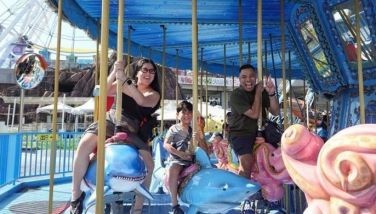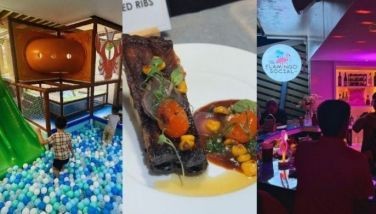Jumping to quick conclusions won't nab the 'bombers'
Sure, Philippine National Police "Chief" Panfilo Lacson may be a tough cop and a straight shooter. But shooting off at the mouth won't get him anywhere in solving the Megamall blast -- or perhaps he was simply misquoted.
 Old police reporters like this writer know, from past experience, that
sometimes newsmen trying to s.s. a story (don't ask me to translate that) from
meager shreds of information, including illegible police blotters, are
sometimes tempted to put a colorful spin on a chance remark made by some police
officer or investigator. Did General Ping Lacson really say that some "rightist
groups" might have been involved in the bombings that shook two shopping
centers in Metro Manila?
Old police reporters like this writer know, from past experience, that
sometimes newsmen trying to s.s. a story (don't ask me to translate that) from
meager shreds of information, including illegible police blotters, are
sometimes tempted to put a colorful spin on a chance remark made by some police
officer or investigator. Did General Ping Lacson really say that some "rightist
groups" might have been involved in the bombings that shook two shopping
centers in Metro Manila?
Perhaps Lacson might be blowing smoke in our eyes in order to defuse the panic over the possibility that murderous bandits and rebels like the Abu Sayyaf or the New People's Army (NPA) might have planted these bombs. Somehow, in the cops' lexicon, "rightists" sounds somewhat more benign than "terrorists", although the victims of the Right (or the Left, for that matter) end up just as stone dead in the mortuary.
Even Lacson's rather casual comment that the bombers were "more on the right" than on the left impinges weirdly on the ear. It sends the bothersome signal that he's being deliberately vague. Why didn't he simply reply to reporters: "Nothing to say yet," or "It's still too early to comment"? The truth is that it's too early. Nobody can blame the general, of course, for saying something. We journalists can too often be pushy and demanding, particularly in -- to cite the buzzword -- "ambush" interviews.
To begin with, the ingredients in the jerry-made but more powerful "bomb" assembled in the women's lavatory of Cinema 6 in the SM Megamall by the unknown bombers appears to be far different from those utilized in the smaller bomb which exploded in the Glorietta in Makati.
And who says that the Abu Sayyaf insurgents -- who were given special bomb-making and dispersal training by the Kuwaiti-born terrorist and bomb-expert Ramzi Yousef (the Federal Bureau of Investigation called him "one of the most expert") -- don't have the sophistication to assemble and set the timer for such "bombs"? If you will recall, when Yousef boarded a Philippine Airlines (PAL) Flight 434 to Cebu -- which went onwards toward Tokyo -- on December 11, 1994, he concealed the batteries which constituted the fuse in the heel of each of his shoes, then went into the plane's toilet to assemble his "bomb" from innocent-looking ingredients. The bomb which he planted under a passenger seat before he deplaned in Mactan blew up hours later when the aircraft was over Okinawa and killed an unfortunate Japanese engineer seated in that "death seat," namely 26K. What was lucky was that the poor man's body (his bottom, really) absorbed enough of the exploded shrapnel to prevent the shards from cutting through the aileron cables of the plane completely -- and the pilot was able to wrestle the crippled aircraft safely to the ground.
There could, naturally, be other culprits in the Megamall terrorist outrage, but again the Abu Sayyaf and other Muslim rebels -- who received training in this "technique" from one of the world's Terrorist Masters -- are quite capable of smuggling in, hastily-assembling, and detonating bombs. They aren't as ragtag a bunch as many earlier surmised.
On February 26, 1993, when Yousef exploded his far more massive bomb in the underground car park of the World Trade Twin Towers in New York, the blast rushed upwards, tearing through five reinforced concrete floors and cutting off all power. A hole 12 feet by 180 feet was blown in the side of the wall of level 2, sending concrete and ripped metal flying to slice through arms and legs and snap spines. Windows shattered in cars outside the building. The shock waves were felt a mile away, and New Yorkers thought they were experiencing an earthquake. Ten thousand people had to be evacuated from the building in darkness, while 750 firetrucks arriving to battle the conflagration engendered did not get it under control within two hours and it took another three weeks by the remaining firemen to douse the smoldering embers completely.
In the book I quoted yesterday, investigative reporter Simon Reeve (The New Jackals, Northeastern University Press, Boston, 1999) on page 75 commented on the World Trade Center "bomb" that "Other terrorists have tried and failed to build these devices in the past but few had the same level of technical expertise as Ramzi Yousef. The bomb he used to wreak havoc in the World Trade Center had been used only once before in 73,000 explosions recorded by the FBI. Even the FBI admits that he is a master of explosives."
In the same volume (page 136), Reeve reveals Yousef's friendship with Abdurajak Abubakar Janjalani, the founder and leader of the Abu Sayyaf -- who, incidentally, was killed last year in Basilan owing to a police operation mounted to "get him."
Reeve says they met in the "terrorist milieu surrounding the frontier town of Peshawar" where the Pakistanis and their Afghan protégés maintained teaching camps. "An Islamic missionary had encouraged Janjalani to study Islamic jurisprudence in Saudi Arabia during the early 1980s, and he eventually appeared in Afghanistan and spent several years fighting against the Soviets with 200 other Filipinos."
When the Red Army retreated from Afghanistan, Janjalani, according to Reeve, "began travelling back and forth between his home on Basilan, where he was fostering a new spirit of Muslim militancy, and the area around Peshawar, staying in veterans' guesthouses and hunting for supporters. Janjalani was the founder and leader of the Abu Sayyaf (Janjalani's Afghan fighting name), the principal hardline Islamic terrorist gang in the Philippines, and Osama bin Laden either directly or indirectly offered him financial backing." Those are Reeve's words. I think that Senator Aquilino Pimentel -- who a few days ago was quoted as advancing the strange theory that the Philippine government had "organized" the Abu Sayyaf as one of its undercover Muslim forces (Gee whiz, Nene, are you or aren't you from Mindanao?) -- ought to read this compelling book.
Abu Sayyaf means, of course, "Bearer of the Sword" which had been Janjalani's nom de guerre in the Afghanistan war.
Reeve also mentions in his book that Edwin Angeles, who became Janjalani's deputy in the Abu Sayyaf, confirmed that Yousef first came to the Philippines in the summer of 1991, then, after a spell in Pakistan, returned here in December 1991. "Angeles knew Yousef as 'The Chemist' because of his abilities with explosives, and claims that Yousef, Abdul Hakim Murad and Wali Khan Amin Shah trained Abu Sayyaf terrorists in the southern Philippines and stayed for roughly three months."
Now, don't you think that's interesting?
Since Janjalani's death, a five-man council has been leading the Abu Sayyaf and these are the "war chiefs" with whom government negotiator Robert Aventajado has been dealing. Janjalani's son, Ghaddafy Janjalani, is too young and inexperienced to have assumed the leadership of that bunch.
If you're wondering why the 21 hostages snatched from the Malaysian resort of Semporna are being held in Patikul, Sulu, it's timely to recall that Patikul is a well-known Bin Laden base of operations.
Right now, the Mindanao area is swarming with "foreign" operatives. Among them are a number of Central Intelligence Agency (CIA) and anti-terrorist FBI agents bent on capturing one target "alive". This is a man named Khalifa, the brother-in-law of Osana Bin Laden (married to one of the terrorist financier's sisters). The Americans say Khalifa was sent to the Philippines in 1988 to recruit volunteers to fight in Afghanistan from among the six million Muslims here.
As his "cover," Khalifa set up a rattan manufacturing business and organized a number of Islamic NGOs and charities, particularly the Daw'l Imam Al-Shafee Center or the "Imam Shafie Institute" in Patikul, which is a Sulu fishing village. He also married a Filipino wife, and from Patikul went off to Basilan as well as Cotabato, Maguindanao, and Taw-Tawi.
Khalifa and the late Janjalani, both "Afghan fighters", were buddy-buddy. Now you know why Patikul became so prominent a location in the current hostage crisis.
If you have any doubt that the Abu Sayyaf, or for that matter, the Moro Islamic Liberation Front (MILF), are well-funded, all you have to do is remember that Bin Laden, by conservative estimate, has a private fortune of $800 million, plus many profitable investments around the world.
His vow is to bring the "sword of Islam" all over and fight the Americans, the Israelis, and all hostile unbelievers. He's still holed up in Afghanistan, but his agents seem to be everywhere.
On another front: If the MILF rebels under Hashim Salamat are rumored to be building up their forces to try to "retake" the Narciso Ramos Highway and their ten-kilometer "tunnel complex" there, this may be a move designed to divert what the MILF fear is a coming government offensive aimed at their headquarters, Camp Abubakar. Abangan.
Finally, let me reiterate that the former Libyan Ambassador, our friend Rajab Azzarouq -- who was Tripoli's envoy here for nine years -- be kept out of the negotiations, out of Mindanao, and preferably requested to go home to Libya. Those who support Azzarouq's intrusion into the negotiations say that he had proved to be an effective mediator with the Moro National Liberation Front (MNLF) and the MILF, and other Moro rebels in the past. You bet he was. After all, his country, Libya, under their Glorious Leader Moammar Ghaddafi (also spelled Khaddafi), has been among the backers of rebellion in Mindanao for many years. When he was in "exile", former MNLF chieftain now ARMM Governor Nur Misuari lived in Tripoli, and shuttled back and forth between Libya and Jiddah in Saudi Arabia.
Moreover, Ghaddafi's son, Saif Ghaddafi, has been a frequent visitor to Mindanao -- no less than FIVE times -- his latest visit last December, if I'm not mistaken. Saif was not there to deliver copies of the Koran, the Muslim holy book, I kid thee not.
And, in case we've forgotten, Christians still outnumber Muslims in Mindanao, about 2.5 to one.
- Latest
- Trending

























